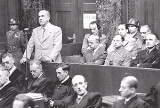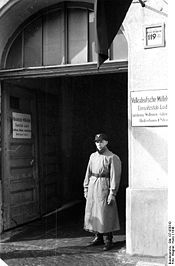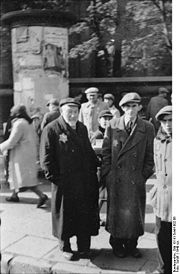
August Frank
Encyclopedia
August Frank was an official of the Main Economic Administration Office of the Nazi SS (SS-Wirtschafts-Verwaltungshauptamt
) generally known by its initials WVHA
. WVHA was, among other things, responsible for the administration of the Nazi concentration camps
. After the war, the higher WVHA officials, including Frank, were placed on trial for, and convicted of, war crimes and crimes against humanity.
as a private on May 1, 1932, and the Nazi party on January 1, 1933. From 1933 to 1935, Frank worked at minor administrative duties in connection with a number of small industries at the Dachau concentration camp manned by inmate labor, most of which were concerned with concentration camp maintenance.
, Frank became SS Administrative Officer of the Special Purpose Troops (SS-Verfügungstruppe
) and of the concentration camp guards, the SS Death's Head units (SS-Totenkopfverbände
), although the presence of a bureaucratic rival somewhat limited his authority in the second capacity. In February 1940, Frank became chief supply officer of the Waffen SS and Death's Head units under Pohl.
. Amtsgruppe A was the administrative branch of WVHA. It comprised five offices (Ämter), as follows:

 A measure of the detailed planning that Frank and other Nazis put into the carrying out of the Holocaust and the deprivation of the property of the murdered Jews can be gauged from a memorandum prepared by Frank on September 26, 1942
A measure of the detailed planning that Frank and other Nazis put into the carrying out of the Holocaust and the deprivation of the property of the murdered Jews can be gauged from a memorandum prepared by Frank on September 26, 1942
. For example, Frank gave instructions on dealing with the underwear of the murder victims. This memorandum, when it came to light after the war, played a key role in refuting Frank's claims that he had no knowledge that Jews were being murdered en masse in the extermination camps of Operation Reinhard
. The memorandum is also notable as an example of the use of the Nazi euphemism "evacuation" of the Jews, which meant their systematic murder.
on accusations that during his work at WVHA he had committed crimes against humanity. The court concerned itself with Frank's conduct between 1 September 1939, and 1 September 1943.
Frank's defense was that he thought the only people in concentration camps were solely composed of German nationals who were either habitual criminals or genuine threats to the Nazi regime. This was rejected by the court, which found that Frank knew and actively participated in the Nazi slave labor program.
The court held that the following evidence, among other things, showed Frank's knowledge of the international slave labor program that the Nazi concentration camps had become:
Frank appears to have planned to personally profit from concentration camp labor. He was an incorporating partner with Georg Loerner, another WVHA official, in a leather and textile enterprise at Dachau. Based on this and other evidence, the court rejected Frank's testimony as incredible:
In particular, Frank at his trial claimed he only became aware of the Jewish extermination program after hearing Himmler's Posen speech on October 4, 1943, a month after he had left the WVHA. By this time, the Nazis had nearly completed the mass killings of the Jews of Poland and nearby areas of Eastern Europe in what has become known as Action Reinhard
, also known as Operation Reinhard and the Reinhard action. Frank handled the huge amount of personal property that was either robbed from the Jews while they were alive or stolen from their bodies (there were 2,000 car loads of textiles, for instance). In his September 26, 1942 memorandum, Frank had chosen to designate this property as "Jewish concealed and stolen goods." The court rejected Frank's claim that he couldn't have known of the source of these goods:
Frank claimed that he didn't know and had no reason to know that the people from whom the property had come from had been murdered en masse; he testified that he thought all the property accumulating from Operation Reinhard had come from Jews who had died naturally in concentration camps. The court rejected this contention, relying again on the categories of property Frank had dealt with in his September 26, 1942 memorandum :
. Frank's highest rank in the SS was Lieutenant General (Obergruppenfuehrer).
In 1951 Frank's sentence was commuted to 15 years.
SS-Wirtschafts-Verwaltungshauptamt
The SS-Wirtschafts-Verwaltungshauptamt was responsible for managing the finances, supply systems and business projects for the Allgemeine-SS...
) generally known by its initials WVHA
SS-Wirtschafts-Verwaltungshauptamt
The SS-Wirtschafts-Verwaltungshauptamt was responsible for managing the finances, supply systems and business projects for the Allgemeine-SS...
. WVHA was, among other things, responsible for the administration of the Nazi concentration camps
Nazi concentration camps
Nazi Germany maintained concentration camps throughout the territories it controlled. The first Nazi concentration camps set up in Germany were greatly expanded after the Reichstag fire of 1933, and were intended to hold political prisoners and opponents of the regime...
. After the war, the higher WVHA officials, including Frank, were placed on trial for, and convicted of, war crimes and crimes against humanity.
Early Nazi career
Frank joined the SSSchutzstaffel
The Schutzstaffel |Sig runes]]) was a major paramilitary organization under Adolf Hitler and the Nazi Party. Built upon the Nazi ideology, the SS under Heinrich Himmler's command was responsible for many of the crimes against humanity during World War II...
as a private on May 1, 1932, and the Nazi party on January 1, 1933. From 1933 to 1935, Frank worked at minor administrative duties in connection with a number of small industries at the Dachau concentration camp manned by inmate labor, most of which were concerned with concentration camp maintenance.
Rise in Nazi hierarchy
In 1935, at the request of Oswald PohlOswald Pohl
Oswald Pohl was a Nazi official and member of the SS , involved in the mass murders of Jews in concentration camps, the so-called Final Solution.-Early years:...
, Frank became SS Administrative Officer of the Special Purpose Troops (SS-Verfügungstruppe
SS-Verfügungstruppe
The SS-Verfügungstruppe was formed in 1934 as combat troops for the NSDAP. By 1940 these military SS units had become the nucleus of the Waffen-SS....
) and of the concentration camp guards, the SS Death's Head units (SS-Totenkopfverbände
SS-Totenkopfverbände
SS-Totenkopfverbände , meaning "Death's-Head Units", was the SS organization responsible for administering the Nazi concentration camps for the Third Reich....
), although the presence of a bureaucratic rival somewhat limited his authority in the second capacity. In February 1940, Frank became chief supply officer of the Waffen SS and Death's Head units under Pohl.
Concentration camp administrator
When the WVHA was organized in 1942, he became Pohl's deputy chief of WVHA and chief of Department (Amtsgruppe) A, the administrative division of WVHA. He served in this capacity until 1 September 1943, when he was permitted to resign to become administrative chief of the Order PoliceOrdnungspolizei
The Ordnungspolizei or Orpo were the uniformed regular police force in Nazi Germany between 1936 and 1945. It was increasingly absorbed into the Nazi police system. Owing to their green uniforms, they were also referred to as Grüne Polizei...
. Amtsgruppe A was the administrative branch of WVHA. It comprised five offices (Ämter), as follows:
- Amt A-1: budgets.
- Amt A-2: finance and payroll.
- Amt A-3: legal matters.
- Amt A-4: auditing office.
- Amt A-5: personnel.
Involvement in the Holocaust


August Frank memorandum
The August Frank memorandum of September 26 1942 was a directive from SS Lieutenant General August Frank, a higher official of the SS concentration camp administration department. The memorandum provides a measure of the detailed involvement planning that Frank and other Nazis put into the...
. For example, Frank gave instructions on dealing with the underwear of the murder victims. This memorandum, when it came to light after the war, played a key role in refuting Frank's claims that he had no knowledge that Jews were being murdered en masse in the extermination camps of Operation Reinhard
Operation Reinhard
Operation Reinhard was the code name given to the Nazi plan to murder Polish Jews in the General Government, and marked the most deadly phase of the Holocaust, the use of extermination camps...
. The memorandum is also notable as an example of the use of the Nazi euphemism "evacuation" of the Jews, which meant their systematic murder.
Crimes against humanity
After World War II, Frank was placed on trialPohl Trial
The Pohl Trial was the fourth of the twelve trials for war crimes that the United States authorities held in their occupation zone in Germany in Nuremberg after the end of World War II. These twelve trials were all held before U.S...
on accusations that during his work at WVHA he had committed crimes against humanity. The court concerned itself with Frank's conduct between 1 September 1939, and 1 September 1943.
Frank's defense was that he thought the only people in concentration camps were solely composed of German nationals who were either habitual criminals or genuine threats to the Nazi regime. This was rejected by the court, which found that Frank knew and actively participated in the Nazi slave labor program.
The court held that the following evidence, among other things, showed Frank's knowledge of the international slave labor program that the Nazi concentration camps had become:
- A letter from Oswald PohlOswald PohlOswald Pohl was a Nazi official and member of the SS , involved in the mass murders of Jews in concentration camps, the so-called Final Solution.-Early years:...
, dated 26 June 1942, to all Amtsgruppen chiefs (which would have included Frank), stating that the head of every branch office which was provided with prisoners or prisoners of war for work was responsible for the prevention of escape, robbery, and sabotage; - A letter signed by Oswald PohlOswald PohlOswald Pohl was a Nazi official and member of the SS , involved in the mass murders of Jews in concentration camps, the so-called Final Solution.-Early years:...
, but actually dictated by Frank, to Heinrich HimmlerHeinrich HimmlerHeinrich Luitpold Himmler was Reichsführer of the SS, a military commander, and a leading member of the Nazi Party. As Chief of the German Police and the Minister of the Interior from 1943, Himmler oversaw all internal and external police and security forces, including the Gestapo...
, which discussed the commanders of many of the concentration camps and their qualifications and recommendations for reassignments, detachments, and promotions. - Frank's memorandum of September 26, 1942August Frank memorandumThe August Frank memorandum of September 26 1942 was a directive from SS Lieutenant General August Frank, a higher official of the SS concentration camp administration department. The memorandum provides a measure of the detailed involvement planning that Frank and other Nazis put into the...
to SS administrators at Lublin and Auschwitz directing that the Jewish Star be removed from the garments of deceased inmates.
Frank appears to have planned to personally profit from concentration camp labor. He was an incorporating partner with Georg Loerner, another WVHA official, in a leather and textile enterprise at Dachau. Based on this and other evidence, the court rejected Frank's testimony as incredible:
Involvement in genocide
Frank's lawyer claimed Frank "did not work for the political aims of National Socialism." This position was rejected by the court:In particular, Frank at his trial claimed he only became aware of the Jewish extermination program after hearing Himmler's Posen speech on October 4, 1943, a month after he had left the WVHA. By this time, the Nazis had nearly completed the mass killings of the Jews of Poland and nearby areas of Eastern Europe in what has become known as Action Reinhard
Operation Reinhard
Operation Reinhard was the code name given to the Nazi plan to murder Polish Jews in the General Government, and marked the most deadly phase of the Holocaust, the use of extermination camps...
, also known as Operation Reinhard and the Reinhard action. Frank handled the huge amount of personal property that was either robbed from the Jews while they were alive or stolen from their bodies (there were 2,000 car loads of textiles, for instance). In his September 26, 1942 memorandum, Frank had chosen to designate this property as "Jewish concealed and stolen goods." The court rejected Frank's claim that he couldn't have known of the source of these goods:
Frank claimed that he didn't know and had no reason to know that the people from whom the property had come from had been murdered en masse; he testified that he thought all the property accumulating from Operation Reinhard had come from Jews who had died naturally in concentration camps. The court rejected this contention, relying again on the categories of property Frank had dealt with in his September 26, 1942 memorandum :
Acquitted of mass murder
Although the court had ruled that Frank was criminally answerable for the slave labor program and the looting of Jewish property, he escaped criminal liability for the murders themselves, as the court viewed him as in generally being only involved after the people had already been murdered.Member of criminal organization (Nazi SS)
Frank was found guilty also of being a member of a criminal organization, that is, the Nazi SSSchutzstaffel
The Schutzstaffel |Sig runes]]) was a major paramilitary organization under Adolf Hitler and the Nazi Party. Built upon the Nazi ideology, the SS under Heinrich Himmler's command was responsible for many of the crimes against humanity during World War II...
. Frank's highest rank in the SS was Lieutenant General (Obergruppenfuehrer).
Sentence and commutation
On November 3, 1947, Frank was sentenced to life in prison by the tribunal with the following words:In 1951 Frank's sentence was commuted to 15 years.
See also
- August Frank memorandumAugust Frank memorandumThe August Frank memorandum of September 26 1942 was a directive from SS Lieutenant General August Frank, a higher official of the SS concentration camp administration department. The memorandum provides a measure of the detailed involvement planning that Frank and other Nazis put into the...
- Deutsche WirtschaftsbetriebeDeutsche WirtschaftsbetriebeDeutsche Wirtschaftsbetriebe , generally abbreviated DWB was a project launched by the Allgemeine SS to profit from the use of Nazi concentration camp inmates as slave labor.- Holding company for Nazi concerns :...
Further reading
- Allen, Michael Thad, The Business of Genocide: the SS, slave labor, and the concentration camps, University of North Carolina Press, Chapel Hill, NC, 2002 ISBN 0807826774
- Arad, Yitzhak, Belzec, Sobibor, Treblinka—The Operation Reinhard Death Camps, Indiana University Press, 1999 ISBN 0253213053
- Nürnberg Military Tribunal (The "Green" Series), Trials of War Criminals before the Nürnberg Military Tribunals under Control Council Law No. 10 (digitally reproduced at the website of the Mazal Library)

